Social Interaction and Healthy Ageing Case study 2022
VerifiedAdded on 2022/09/17
|8
|2256
|14
AI Summary
Contribute Materials
Your contribution can guide someone’s learning journey. Share your
documents today.
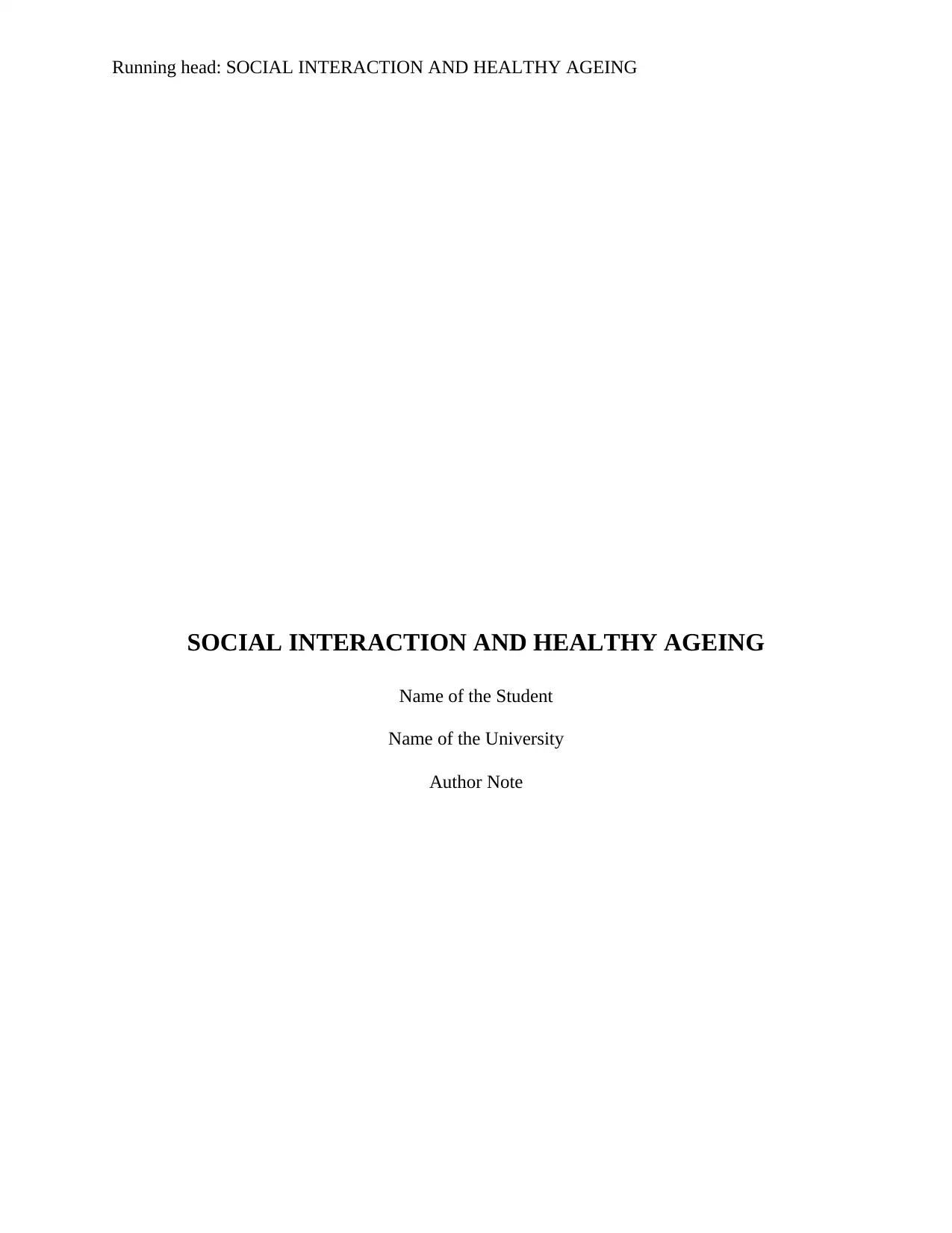
Running head: SOCIAL INTERACTION AND HEALTHY AGEING
SOCIAL INTERACTION AND HEALTHY AGEING
Name of the Student
Name of the University
Author Note
SOCIAL INTERACTION AND HEALTHY AGEING
Name of the Student
Name of the University
Author Note
Secure Best Marks with AI Grader
Need help grading? Try our AI Grader for instant feedback on your assignments.
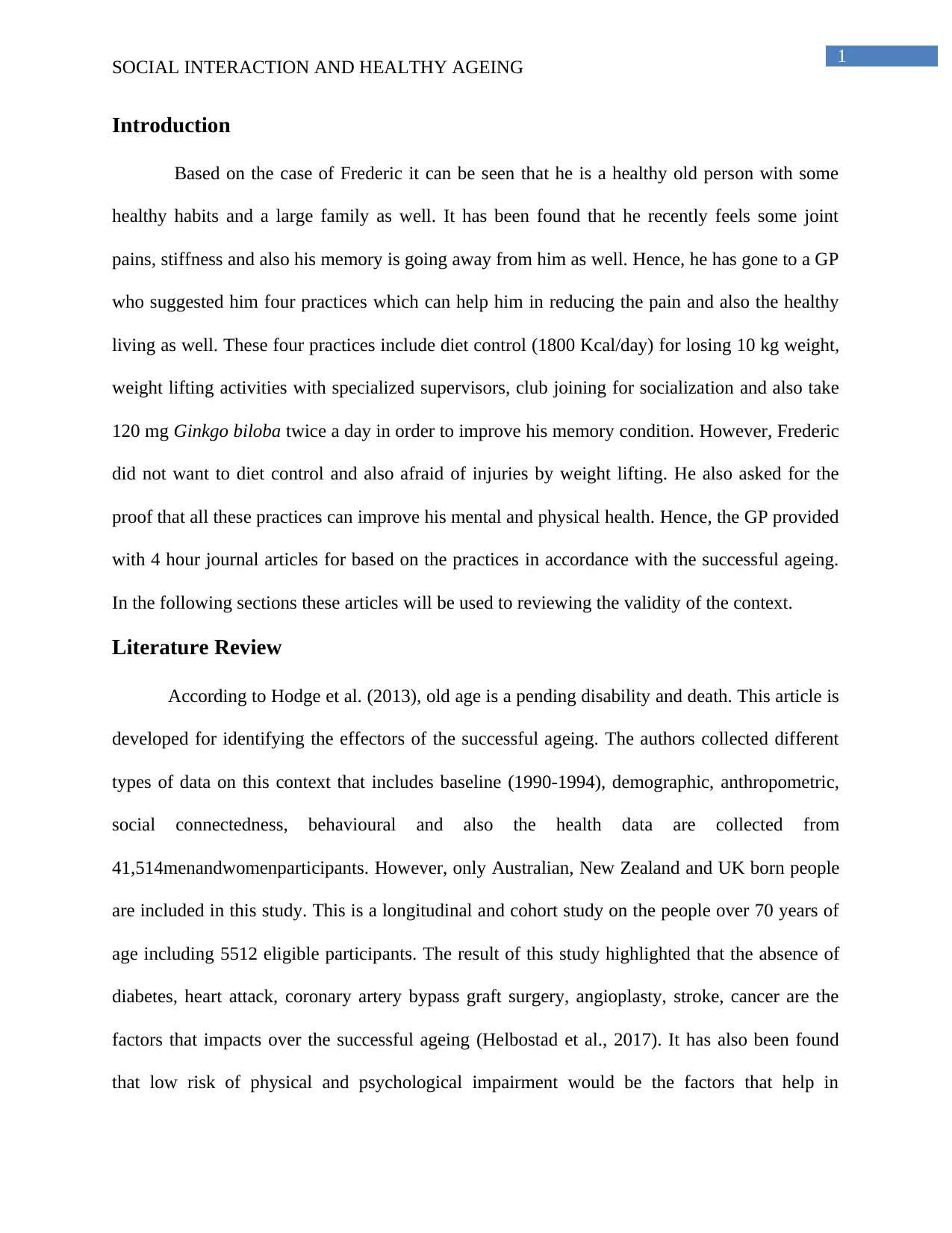
1
SOCIAL INTERACTION AND HEALTHY AGEING
Introduction
Based on the case of Frederic it can be seen that he is a healthy old person with some
healthy habits and a large family as well. It has been found that he recently feels some joint
pains, stiffness and also his memory is going away from him as well. Hence, he has gone to a GP
who suggested him four practices which can help him in reducing the pain and also the healthy
living as well. These four practices include diet control (1800 Kcal/day) for losing 10 kg weight,
weight lifting activities with specialized supervisors, club joining for socialization and also take
120 mg Ginkgo biloba twice a day in order to improve his memory condition. However, Frederic
did not want to diet control and also afraid of injuries by weight lifting. He also asked for the
proof that all these practices can improve his mental and physical health. Hence, the GP provided
with 4 hour journal articles for based on the practices in accordance with the successful ageing.
In the following sections these articles will be used to reviewing the validity of the context.
Literature Review
According to Hodge et al. (2013), old age is a pending disability and death. This article is
developed for identifying the effectors of the successful ageing. The authors collected different
types of data on this context that includes baseline (1990-1994), demographic, anthropometric,
social connectedness, behavioural and also the health data are collected from
41,514menandwomenparticipants. However, only Australian, New Zealand and UK born people
are included in this study. This is a longitudinal and cohort study on the people over 70 years of
age including 5512 eligible participants. The result of this study highlighted that the absence of
diabetes, heart attack, coronary artery bypass graft surgery, angioplasty, stroke, cancer are the
factors that impacts over the successful ageing (Helbostad et al., 2017). It has also been found
that low risk of physical and psychological impairment would be the factors that help in
SOCIAL INTERACTION AND HEALTHY AGEING
Introduction
Based on the case of Frederic it can be seen that he is a healthy old person with some
healthy habits and a large family as well. It has been found that he recently feels some joint
pains, stiffness and also his memory is going away from him as well. Hence, he has gone to a GP
who suggested him four practices which can help him in reducing the pain and also the healthy
living as well. These four practices include diet control (1800 Kcal/day) for losing 10 kg weight,
weight lifting activities with specialized supervisors, club joining for socialization and also take
120 mg Ginkgo biloba twice a day in order to improve his memory condition. However, Frederic
did not want to diet control and also afraid of injuries by weight lifting. He also asked for the
proof that all these practices can improve his mental and physical health. Hence, the GP provided
with 4 hour journal articles for based on the practices in accordance with the successful ageing.
In the following sections these articles will be used to reviewing the validity of the context.
Literature Review
According to Hodge et al. (2013), old age is a pending disability and death. This article is
developed for identifying the effectors of the successful ageing. The authors collected different
types of data on this context that includes baseline (1990-1994), demographic, anthropometric,
social connectedness, behavioural and also the health data are collected from
41,514menandwomenparticipants. However, only Australian, New Zealand and UK born people
are included in this study. This is a longitudinal and cohort study on the people over 70 years of
age including 5512 eligible participants. The result of this study highlighted that the absence of
diabetes, heart attack, coronary artery bypass graft surgery, angioplasty, stroke, cancer are the
factors that impacts over the successful ageing (Helbostad et al., 2017). It has also been found
that low risk of physical and psychological impairment would be the factors that help in
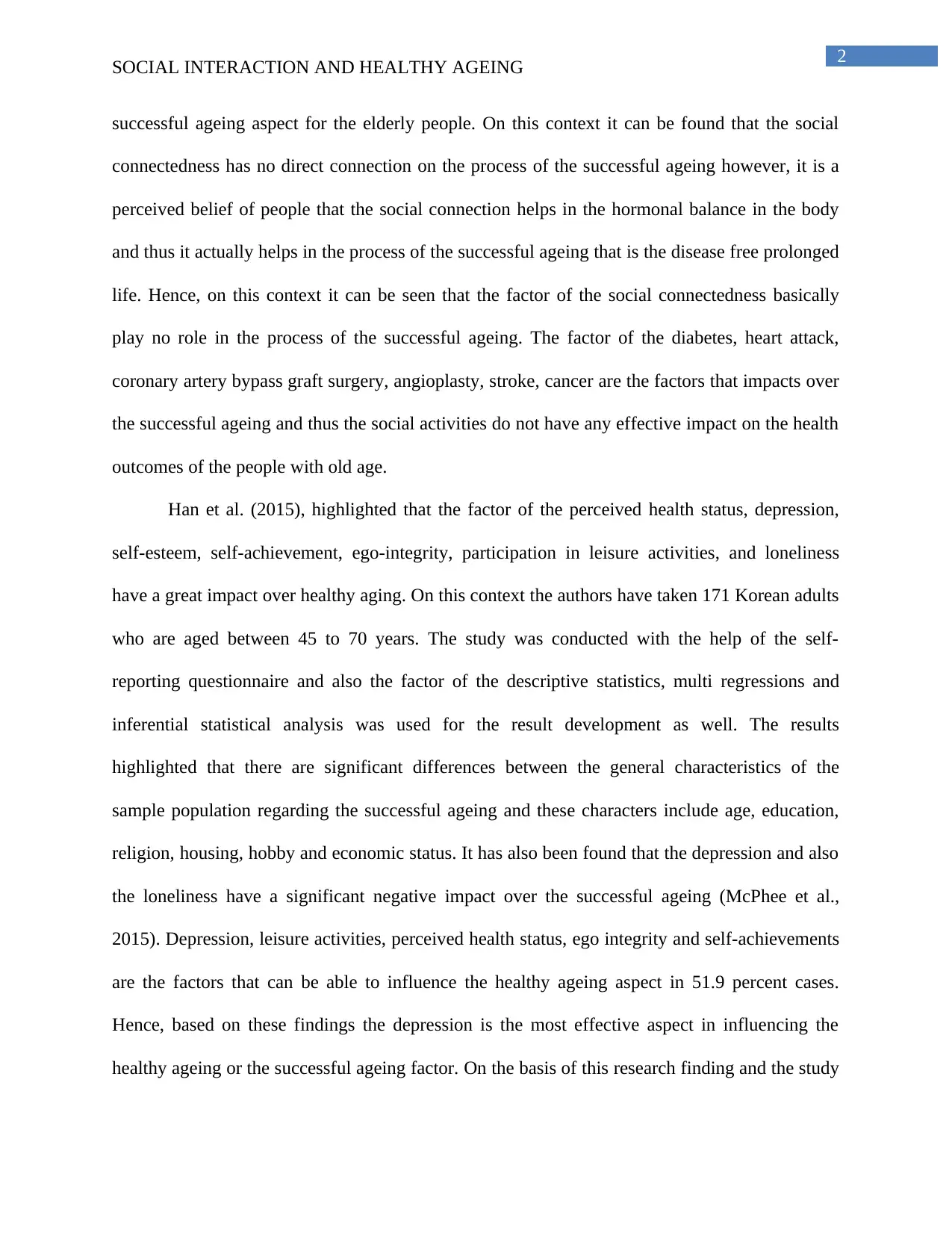
2
SOCIAL INTERACTION AND HEALTHY AGEING
successful ageing aspect for the elderly people. On this context it can be found that the social
connectedness has no direct connection on the process of the successful ageing however, it is a
perceived belief of people that the social connection helps in the hormonal balance in the body
and thus it actually helps in the process of the successful ageing that is the disease free prolonged
life. Hence, on this context it can be seen that the factor of the social connectedness basically
play no role in the process of the successful ageing. The factor of the diabetes, heart attack,
coronary artery bypass graft surgery, angioplasty, stroke, cancer are the factors that impacts over
the successful ageing and thus the social activities do not have any effective impact on the health
outcomes of the people with old age.
Han et al. (2015), highlighted that the factor of the perceived health status, depression,
self-esteem, self-achievement, ego-integrity, participation in leisure activities, and loneliness
have a great impact over healthy aging. On this context the authors have taken 171 Korean adults
who are aged between 45 to 70 years. The study was conducted with the help of the self-
reporting questionnaire and also the factor of the descriptive statistics, multi regressions and
inferential statistical analysis was used for the result development as well. The results
highlighted that there are significant differences between the general characteristics of the
sample population regarding the successful ageing and these characters include age, education,
religion, housing, hobby and economic status. It has also been found that the depression and also
the loneliness have a significant negative impact over the successful ageing (McPhee et al.,
2015). Depression, leisure activities, perceived health status, ego integrity and self-achievements
are the factors that can be able to influence the healthy ageing aspect in 51.9 percent cases.
Hence, based on these findings the depression is the most effective aspect in influencing the
healthy ageing or the successful ageing factor. On the basis of this research finding and the study
SOCIAL INTERACTION AND HEALTHY AGEING
successful ageing aspect for the elderly people. On this context it can be found that the social
connectedness has no direct connection on the process of the successful ageing however, it is a
perceived belief of people that the social connection helps in the hormonal balance in the body
and thus it actually helps in the process of the successful ageing that is the disease free prolonged
life. Hence, on this context it can be seen that the factor of the social connectedness basically
play no role in the process of the successful ageing. The factor of the diabetes, heart attack,
coronary artery bypass graft surgery, angioplasty, stroke, cancer are the factors that impacts over
the successful ageing and thus the social activities do not have any effective impact on the health
outcomes of the people with old age.
Han et al. (2015), highlighted that the factor of the perceived health status, depression,
self-esteem, self-achievement, ego-integrity, participation in leisure activities, and loneliness
have a great impact over healthy aging. On this context the authors have taken 171 Korean adults
who are aged between 45 to 70 years. The study was conducted with the help of the self-
reporting questionnaire and also the factor of the descriptive statistics, multi regressions and
inferential statistical analysis was used for the result development as well. The results
highlighted that there are significant differences between the general characteristics of the
sample population regarding the successful ageing and these characters include age, education,
religion, housing, hobby and economic status. It has also been found that the depression and also
the loneliness have a significant negative impact over the successful ageing (McPhee et al.,
2015). Depression, leisure activities, perceived health status, ego integrity and self-achievements
are the factors that can be able to influence the healthy ageing aspect in 51.9 percent cases.
Hence, based on these findings the depression is the most effective aspect in influencing the
healthy ageing or the successful ageing factor. On the basis of this research finding and the study
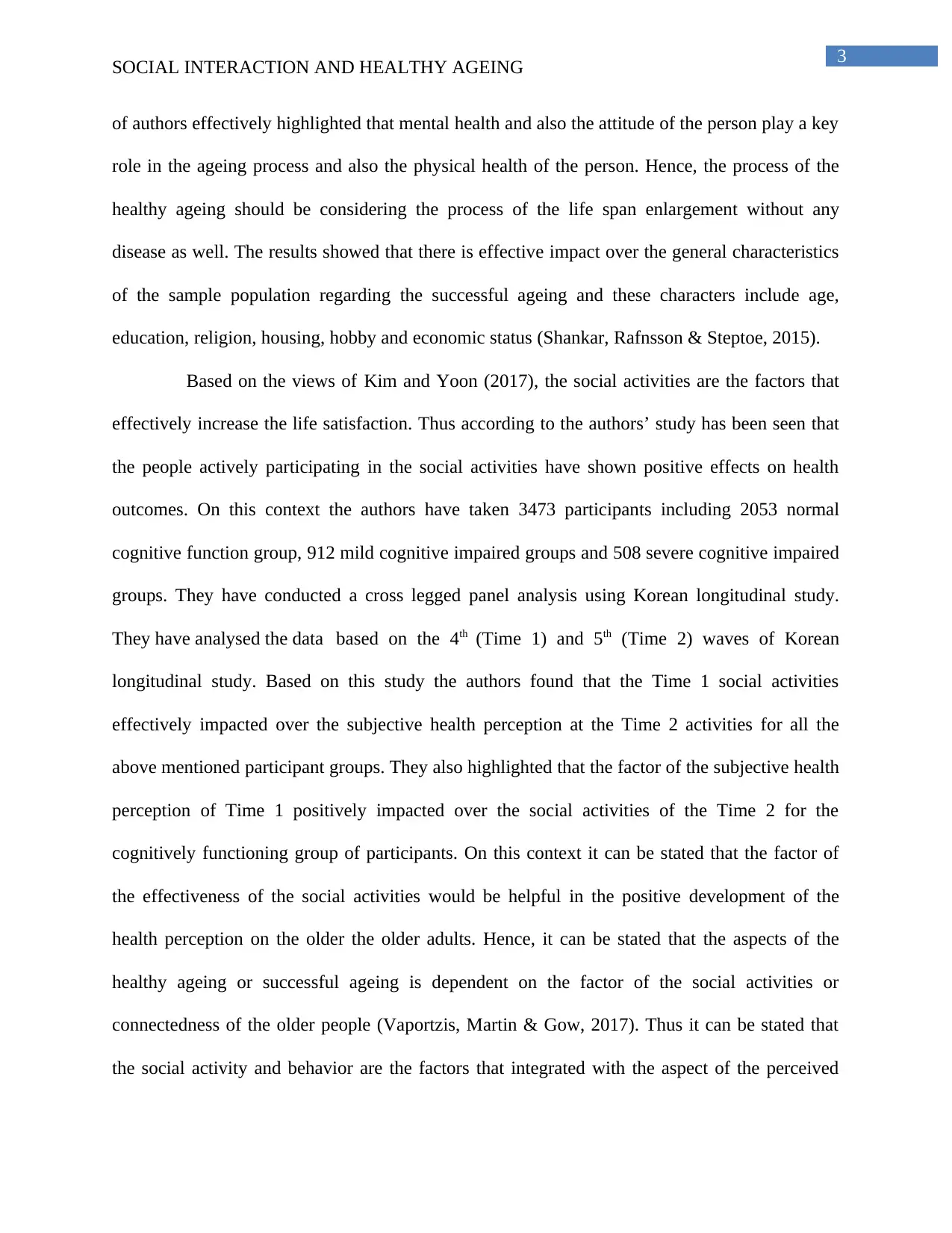
3
SOCIAL INTERACTION AND HEALTHY AGEING
of authors effectively highlighted that mental health and also the attitude of the person play a key
role in the ageing process and also the physical health of the person. Hence, the process of the
healthy ageing should be considering the process of the life span enlargement without any
disease as well. The results showed that there is effective impact over the general characteristics
of the sample population regarding the successful ageing and these characters include age,
education, religion, housing, hobby and economic status (Shankar, Rafnsson & Steptoe, 2015).
Based on the views of Kim and Yoon (2017), the social activities are the factors that
effectively increase the life satisfaction. Thus according to the authors’ study has been seen that
the people actively participating in the social activities have shown positive effects on health
outcomes. On this context the authors have taken 3473 participants including 2053 normal
cognitive function group, 912 mild cognitive impaired groups and 508 severe cognitive impaired
groups. They have conducted a cross legged panel analysis using Korean longitudinal study.
They have analysed the data based on the 4th (Time 1) and 5th (Time 2) waves of Korean
longitudinal study. Based on this study the authors found that the Time 1 social activities
effectively impacted over the subjective health perception at the Time 2 activities for all the
above mentioned participant groups. They also highlighted that the factor of the subjective health
perception of Time 1 positively impacted over the social activities of the Time 2 for the
cognitively functioning group of participants. On this context it can be stated that the factor of
the effectiveness of the social activities would be helpful in the positive development of the
health perception on the older the older adults. Hence, it can be stated that the aspects of the
healthy ageing or successful ageing is dependent on the factor of the social activities or
connectedness of the older people (Vaportzis, Martin & Gow, 2017). Thus it can be stated that
the social activity and behavior are the factors that integrated with the aspect of the perceived
SOCIAL INTERACTION AND HEALTHY AGEING
of authors effectively highlighted that mental health and also the attitude of the person play a key
role in the ageing process and also the physical health of the person. Hence, the process of the
healthy ageing should be considering the process of the life span enlargement without any
disease as well. The results showed that there is effective impact over the general characteristics
of the sample population regarding the successful ageing and these characters include age,
education, religion, housing, hobby and economic status (Shankar, Rafnsson & Steptoe, 2015).
Based on the views of Kim and Yoon (2017), the social activities are the factors that
effectively increase the life satisfaction. Thus according to the authors’ study has been seen that
the people actively participating in the social activities have shown positive effects on health
outcomes. On this context the authors have taken 3473 participants including 2053 normal
cognitive function group, 912 mild cognitive impaired groups and 508 severe cognitive impaired
groups. They have conducted a cross legged panel analysis using Korean longitudinal study.
They have analysed the data based on the 4th (Time 1) and 5th (Time 2) waves of Korean
longitudinal study. Based on this study the authors found that the Time 1 social activities
effectively impacted over the subjective health perception at the Time 2 activities for all the
above mentioned participant groups. They also highlighted that the factor of the subjective health
perception of Time 1 positively impacted over the social activities of the Time 2 for the
cognitively functioning group of participants. On this context it can be stated that the factor of
the effectiveness of the social activities would be helpful in the positive development of the
health perception on the older the older adults. Hence, it can be stated that the aspects of the
healthy ageing or successful ageing is dependent on the factor of the social activities or
connectedness of the older people (Vaportzis, Martin & Gow, 2017). Thus it can be stated that
the social activity and behavior are the factors that integrated with the aspect of the perceived
Secure Best Marks with AI Grader
Need help grading? Try our AI Grader for instant feedback on your assignments.
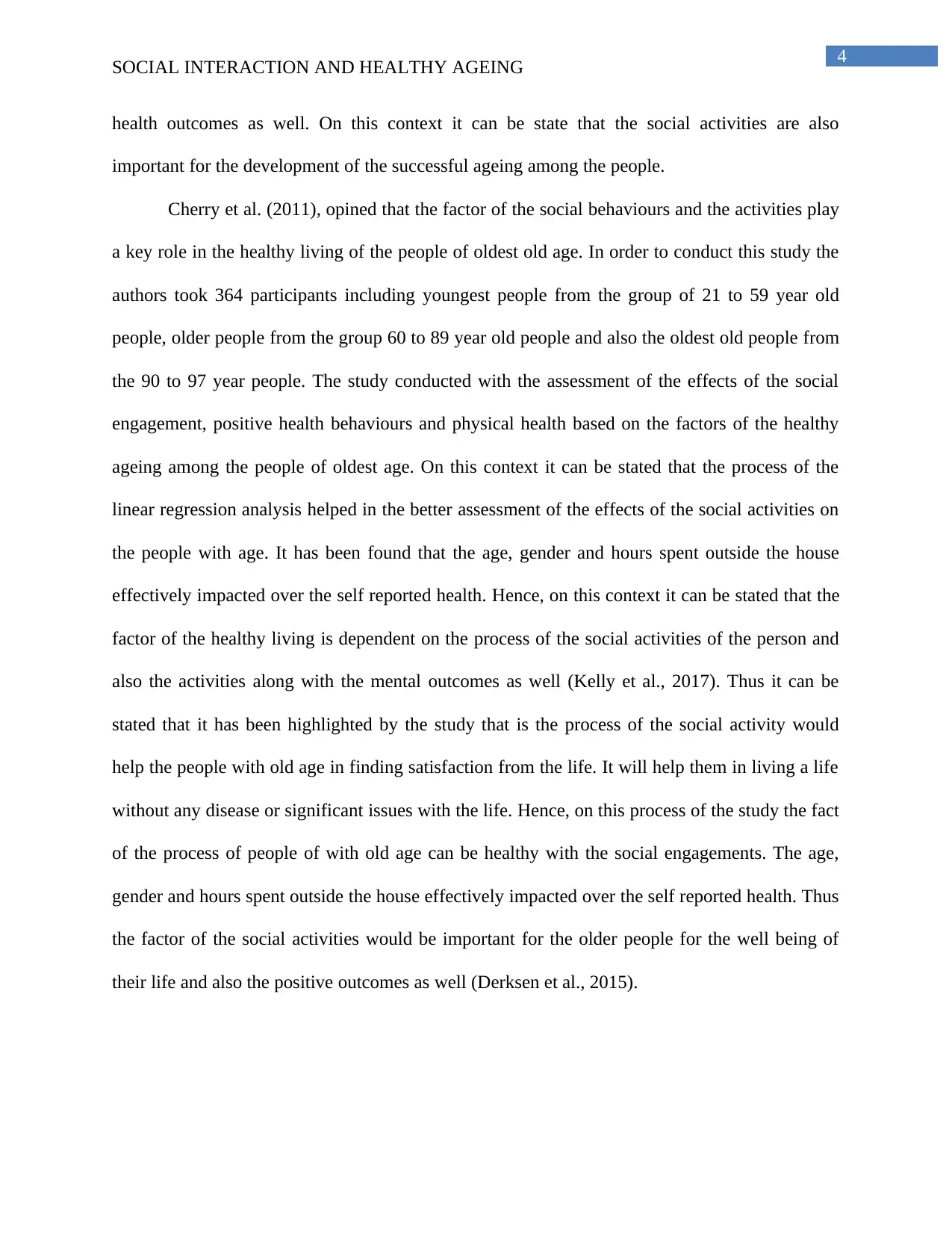
4
SOCIAL INTERACTION AND HEALTHY AGEING
health outcomes as well. On this context it can be state that the social activities are also
important for the development of the successful ageing among the people.
Cherry et al. (2011), opined that the factor of the social behaviours and the activities play
a key role in the healthy living of the people of oldest old age. In order to conduct this study the
authors took 364 participants including youngest people from the group of 21 to 59 year old
people, older people from the group 60 to 89 year old people and also the oldest old people from
the 90 to 97 year people. The study conducted with the assessment of the effects of the social
engagement, positive health behaviours and physical health based on the factors of the healthy
ageing among the people of oldest age. On this context it can be stated that the process of the
linear regression analysis helped in the better assessment of the effects of the social activities on
the people with age. It has been found that the age, gender and hours spent outside the house
effectively impacted over the self reported health. Hence, on this context it can be stated that the
factor of the healthy living is dependent on the process of the social activities of the person and
also the activities along with the mental outcomes as well (Kelly et al., 2017). Thus it can be
stated that it has been highlighted by the study that is the process of the social activity would
help the people with old age in finding satisfaction from the life. It will help them in living a life
without any disease or significant issues with the life. Hence, on this process of the study the fact
of the process of people of with old age can be healthy with the social engagements. The age,
gender and hours spent outside the house effectively impacted over the self reported health. Thus
the factor of the social activities would be important for the older people for the well being of
their life and also the positive outcomes as well (Derksen et al., 2015).
SOCIAL INTERACTION AND HEALTHY AGEING
health outcomes as well. On this context it can be state that the social activities are also
important for the development of the successful ageing among the people.
Cherry et al. (2011), opined that the factor of the social behaviours and the activities play
a key role in the healthy living of the people of oldest old age. In order to conduct this study the
authors took 364 participants including youngest people from the group of 21 to 59 year old
people, older people from the group 60 to 89 year old people and also the oldest old people from
the 90 to 97 year people. The study conducted with the assessment of the effects of the social
engagement, positive health behaviours and physical health based on the factors of the healthy
ageing among the people of oldest age. On this context it can be stated that the process of the
linear regression analysis helped in the better assessment of the effects of the social activities on
the people with age. It has been found that the age, gender and hours spent outside the house
effectively impacted over the self reported health. Hence, on this context it can be stated that the
factor of the healthy living is dependent on the process of the social activities of the person and
also the activities along with the mental outcomes as well (Kelly et al., 2017). Thus it can be
stated that it has been highlighted by the study that is the process of the social activity would
help the people with old age in finding satisfaction from the life. It will help them in living a life
without any disease or significant issues with the life. Hence, on this process of the study the fact
of the process of people of with old age can be healthy with the social engagements. The age,
gender and hours spent outside the house effectively impacted over the self reported health. Thus
the factor of the social activities would be important for the older people for the well being of
their life and also the positive outcomes as well (Derksen et al., 2015).
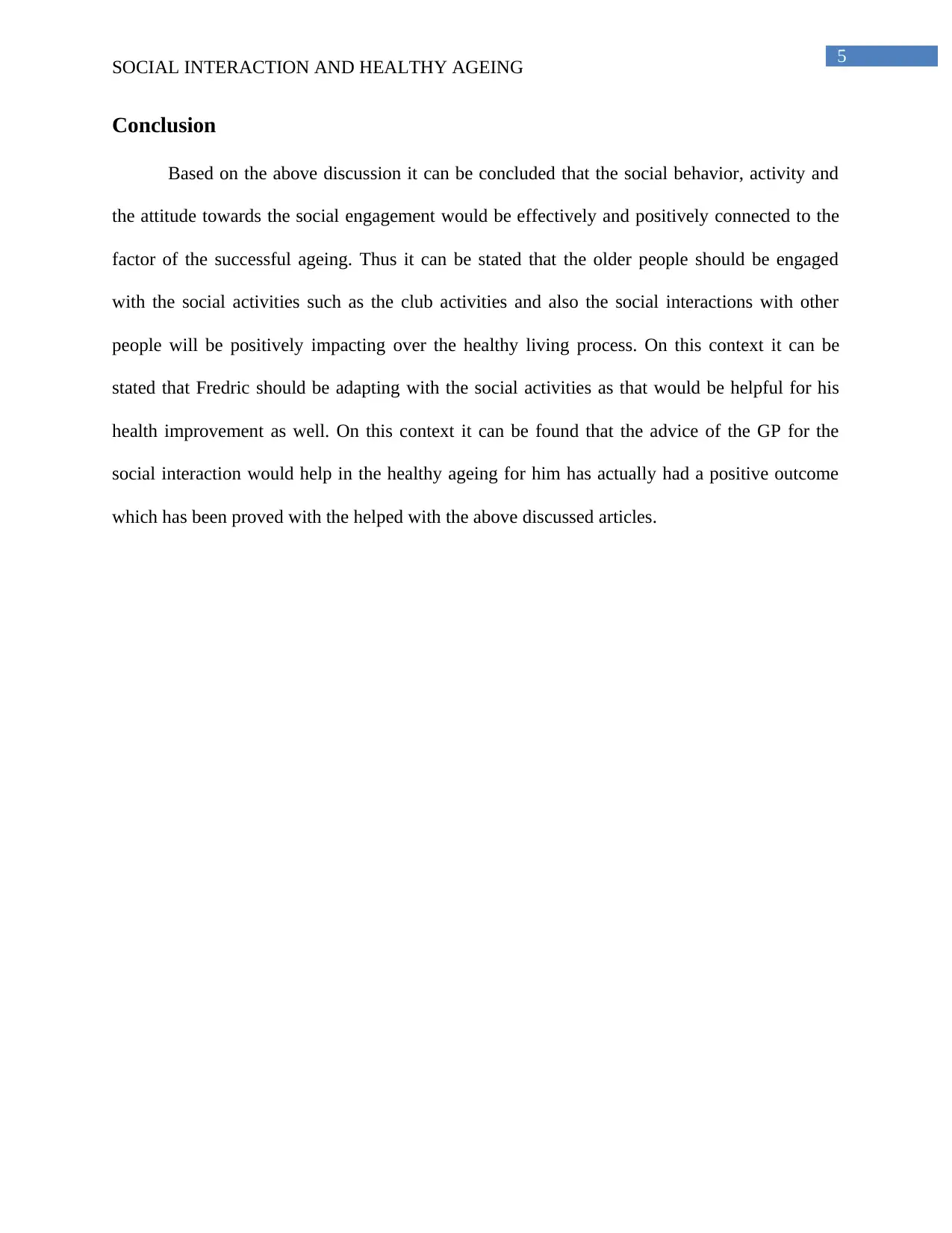
5
SOCIAL INTERACTION AND HEALTHY AGEING
Conclusion
Based on the above discussion it can be concluded that the social behavior, activity and
the attitude towards the social engagement would be effectively and positively connected to the
factor of the successful ageing. Thus it can be stated that the older people should be engaged
with the social activities such as the club activities and also the social interactions with other
people will be positively impacting over the healthy living process. On this context it can be
stated that Fredric should be adapting with the social activities as that would be helpful for his
health improvement as well. On this context it can be found that the advice of the GP for the
social interaction would help in the healthy ageing for him has actually had a positive outcome
which has been proved with the helped with the above discussed articles.
SOCIAL INTERACTION AND HEALTHY AGEING
Conclusion
Based on the above discussion it can be concluded that the social behavior, activity and
the attitude towards the social engagement would be effectively and positively connected to the
factor of the successful ageing. Thus it can be stated that the older people should be engaged
with the social activities such as the club activities and also the social interactions with other
people will be positively impacting over the healthy living process. On this context it can be
stated that Fredric should be adapting with the social activities as that would be helpful for his
health improvement as well. On this context it can be found that the advice of the GP for the
social interaction would help in the healthy ageing for him has actually had a positive outcome
which has been proved with the helped with the above discussed articles.
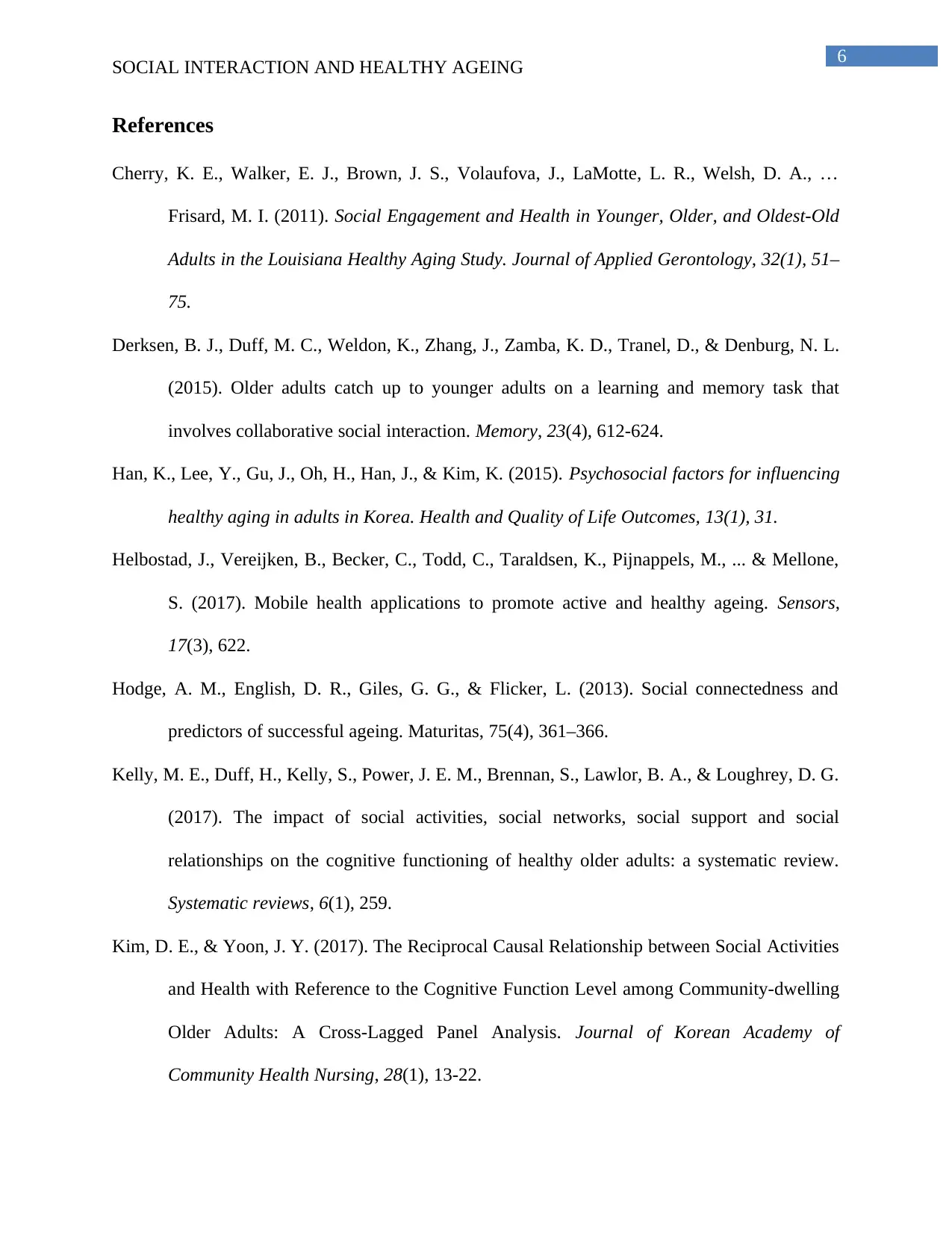
6
SOCIAL INTERACTION AND HEALTHY AGEING
References
Cherry, K. E., Walker, E. J., Brown, J. S., Volaufova, J., LaMotte, L. R., Welsh, D. A., …
Frisard, M. I. (2011). Social Engagement and Health in Younger, Older, and Oldest-Old
Adults in the Louisiana Healthy Aging Study. Journal of Applied Gerontology, 32(1), 51–
75.
Derksen, B. J., Duff, M. C., Weldon, K., Zhang, J., Zamba, K. D., Tranel, D., & Denburg, N. L.
(2015). Older adults catch up to younger adults on a learning and memory task that
involves collaborative social interaction. Memory, 23(4), 612-624.
Han, K., Lee, Y., Gu, J., Oh, H., Han, J., & Kim, K. (2015). Psychosocial factors for influencing
healthy aging in adults in Korea. Health and Quality of Life Outcomes, 13(1), 31.
Helbostad, J., Vereijken, B., Becker, C., Todd, C., Taraldsen, K., Pijnappels, M., ... & Mellone,
S. (2017). Mobile health applications to promote active and healthy ageing. Sensors,
17(3), 622.
Hodge, A. M., English, D. R., Giles, G. G., & Flicker, L. (2013). Social connectedness and
predictors of successful ageing. Maturitas, 75(4), 361–366.
Kelly, M. E., Duff, H., Kelly, S., Power, J. E. M., Brennan, S., Lawlor, B. A., & Loughrey, D. G.
(2017). The impact of social activities, social networks, social support and social
relationships on the cognitive functioning of healthy older adults: a systematic review.
Systematic reviews, 6(1), 259.
Kim, D. E., & Yoon, J. Y. (2017). The Reciprocal Causal Relationship between Social Activities
and Health with Reference to the Cognitive Function Level among Community-dwelling
Older Adults: A Cross-Lagged Panel Analysis. Journal of Korean Academy of
Community Health Nursing, 28(1), 13-22.
SOCIAL INTERACTION AND HEALTHY AGEING
References
Cherry, K. E., Walker, E. J., Brown, J. S., Volaufova, J., LaMotte, L. R., Welsh, D. A., …
Frisard, M. I. (2011). Social Engagement and Health in Younger, Older, and Oldest-Old
Adults in the Louisiana Healthy Aging Study. Journal of Applied Gerontology, 32(1), 51–
75.
Derksen, B. J., Duff, M. C., Weldon, K., Zhang, J., Zamba, K. D., Tranel, D., & Denburg, N. L.
(2015). Older adults catch up to younger adults on a learning and memory task that
involves collaborative social interaction. Memory, 23(4), 612-624.
Han, K., Lee, Y., Gu, J., Oh, H., Han, J., & Kim, K. (2015). Psychosocial factors for influencing
healthy aging in adults in Korea. Health and Quality of Life Outcomes, 13(1), 31.
Helbostad, J., Vereijken, B., Becker, C., Todd, C., Taraldsen, K., Pijnappels, M., ... & Mellone,
S. (2017). Mobile health applications to promote active and healthy ageing. Sensors,
17(3), 622.
Hodge, A. M., English, D. R., Giles, G. G., & Flicker, L. (2013). Social connectedness and
predictors of successful ageing. Maturitas, 75(4), 361–366.
Kelly, M. E., Duff, H., Kelly, S., Power, J. E. M., Brennan, S., Lawlor, B. A., & Loughrey, D. G.
(2017). The impact of social activities, social networks, social support and social
relationships on the cognitive functioning of healthy older adults: a systematic review.
Systematic reviews, 6(1), 259.
Kim, D. E., & Yoon, J. Y. (2017). The Reciprocal Causal Relationship between Social Activities
and Health with Reference to the Cognitive Function Level among Community-dwelling
Older Adults: A Cross-Lagged Panel Analysis. Journal of Korean Academy of
Community Health Nursing, 28(1), 13-22.
Paraphrase This Document
Need a fresh take? Get an instant paraphrase of this document with our AI Paraphraser
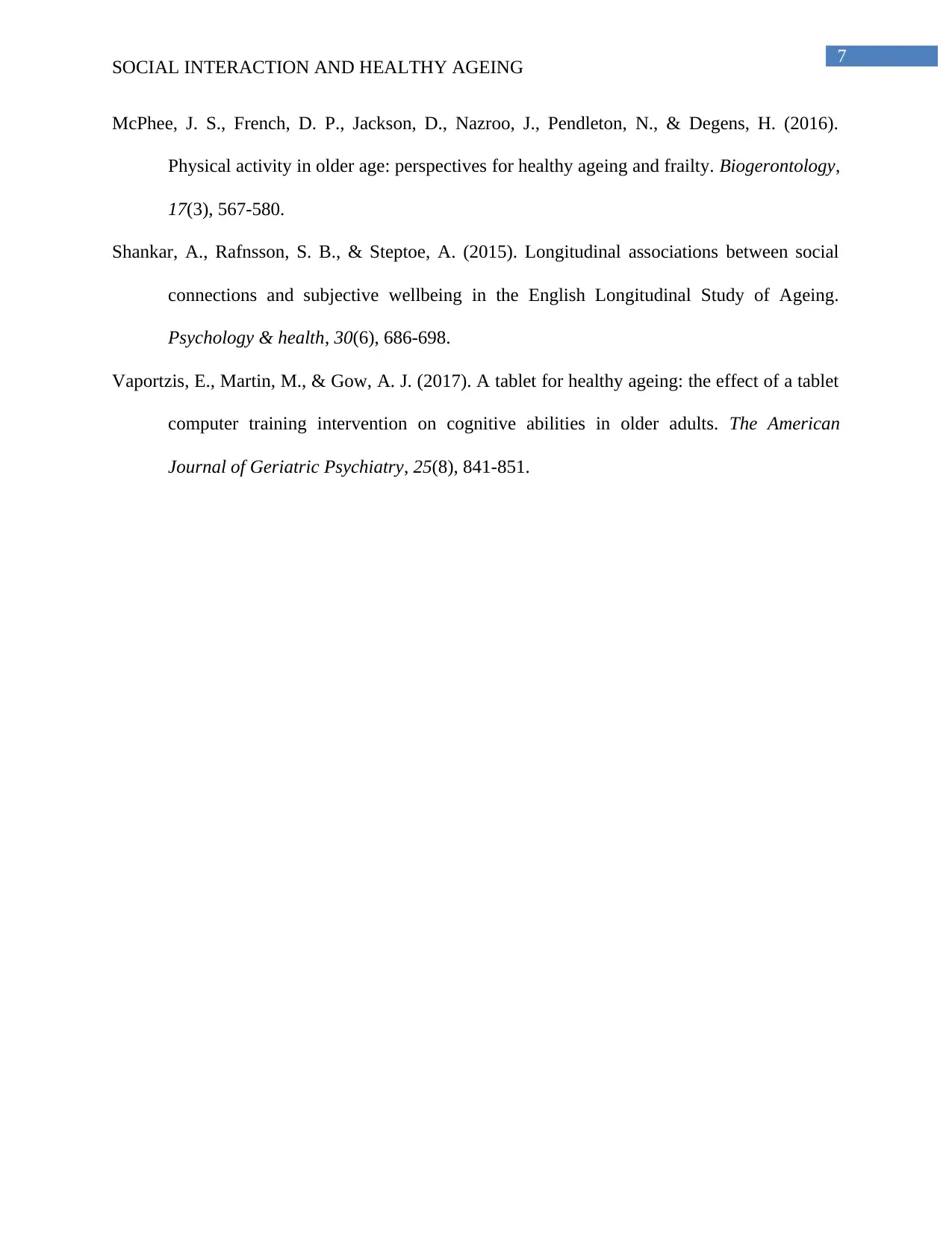
7
SOCIAL INTERACTION AND HEALTHY AGEING
McPhee, J. S., French, D. P., Jackson, D., Nazroo, J., Pendleton, N., & Degens, H. (2016).
Physical activity in older age: perspectives for healthy ageing and frailty. Biogerontology,
17(3), 567-580.
Shankar, A., Rafnsson, S. B., & Steptoe, A. (2015). Longitudinal associations between social
connections and subjective wellbeing in the English Longitudinal Study of Ageing.
Psychology & health, 30(6), 686-698.
Vaportzis, E., Martin, M., & Gow, A. J. (2017). A tablet for healthy ageing: the effect of a tablet
computer training intervention on cognitive abilities in older adults. The American
Journal of Geriatric Psychiatry, 25(8), 841-851.
SOCIAL INTERACTION AND HEALTHY AGEING
McPhee, J. S., French, D. P., Jackson, D., Nazroo, J., Pendleton, N., & Degens, H. (2016).
Physical activity in older age: perspectives for healthy ageing and frailty. Biogerontology,
17(3), 567-580.
Shankar, A., Rafnsson, S. B., & Steptoe, A. (2015). Longitudinal associations between social
connections and subjective wellbeing in the English Longitudinal Study of Ageing.
Psychology & health, 30(6), 686-698.
Vaportzis, E., Martin, M., & Gow, A. J. (2017). A tablet for healthy ageing: the effect of a tablet
computer training intervention on cognitive abilities in older adults. The American
Journal of Geriatric Psychiatry, 25(8), 841-851.
1 out of 8
Your All-in-One AI-Powered Toolkit for Academic Success.
+13062052269
info@desklib.com
Available 24*7 on WhatsApp / Email
![[object Object]](/_next/static/media/star-bottom.7253800d.svg)
Unlock your academic potential
© 2024 | Zucol Services PVT LTD | All rights reserved.
